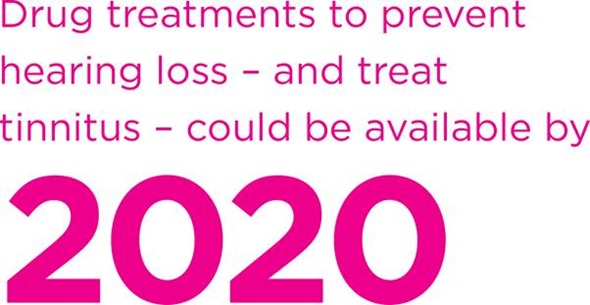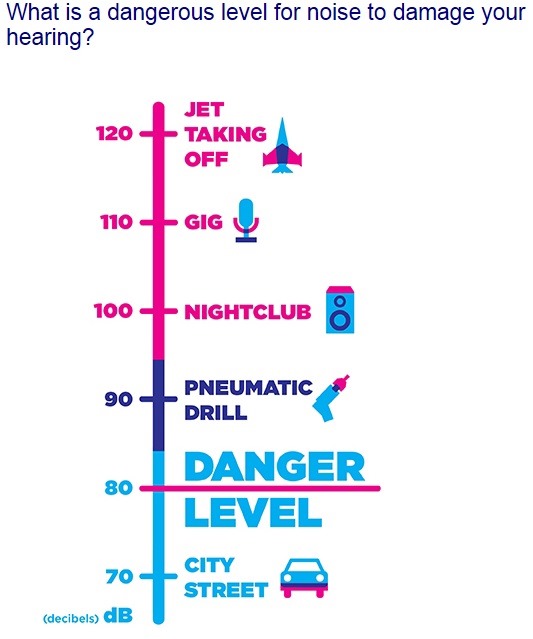By Louise Hart, Senior Audiologist at Action on Hearing Loss
Having been an audiologist for many years now, often the first comment made by members of the public when discussing tinnitus is “I know there is nothing you can do about it and I just have to learn to live with it”.
It is so frustrating to hear this time after time, because – contrary to public opinion - it’s not true. Although our knowledge and understanding of tinnitus still has a long way to go, in the last few years research has improved its grasp on tinnitus, and as such we are heading in a more positive direction for sufferers.
There are also interventions that we know work, and because of this increased knowledge we are starting to understand why.

What is tinnitus?
Tinnitus is a medical term to describe the perception of noise either in one ear, both ears or in the head, when there is no corresponding external sound. In the UK there are approximately 600,000 people whose tinnitus has a significant negative impact on their quality of life and health.
When we suffer from a malady, it is normal for us to want to know what the cause is. Like many other health issues the answer to this is never simple. There are many different trigger factors for tinnitus other than the obvious age and noise exposure, for instance ear disease, head and neck disorders, circulation issues, certain medications, and even stress can trigger the onset of tinnitus.

What causes tinnitus?
So what exactly happens in the ear or the brain? At the moment there are several different theories as to where tinnitus may start, how it may start and what processes or parts of the brain may be involved in its maintenance.
As an organization we are funding research at the University of Newcastle to try and delve into the possible different strata of states that we presently think tinnitus may have.
Robert Sweetow (PhD) gives a great explanation of the present theories of tinnitus origin:
- ‘Disruption of auditory input (e.g., hearing loss) and resultant increased gain (activity) within the central auditory system.
- Decrease in inhibitory (efferent) function.
- Over-representation of edge-frequencies (cortical plasticity).
- Other somatosensory influences (Cervical disturbances, TMJ, etc.).
- Extralemniscal neurons, particularly in dorsal cochlear nucleus and AII area, receiving input from somatosensory system.
- Association with fear and threat (limbic system-emotional brain) and increased attention related to limbic system involvement.
- Widely distributed gamma network.
- Dysfunctional gating in basal ganglia or thalamic reticular nucleus.
One of the newest theories is that our brain has lost its normal ability to block or tune out a negative sensory signal. There is a linked network of brain structures that is involved in emotion, behavior, and long-term memory acts as a gatekeeper to keep the tinnitus signal from reaching the auditory cortex. Robert Sweetow once again gives a good technical explanation:
Sensory information then enters both the auditory and the limbic systems through the medial geniculate nucleus (MGN) and before the signal is processed, it travels through the thalamic reticular nucleus (TRN), which evaluates whether or not it should be passed on."
"There is a significant loss of volume in the medial prefrontal cortex (mPFC) in people with tinnitus/ and or chronic pain. This structure projects into and activates the TRN. If the volume loss creates a loss of neurons, the mPFC and TRN will malfunction.”
Put simply, damage to this system probably affects the perception of sensory signals in such a way that either tinnitus or chronic pain can develop and carry on in a self-perpetuating loop. It’s no surprise that stress may have big impact on these loops and could possibly be one of the factors involved in the transition from mild to severe tinnitus.

Tinnitus interventions
As there are so many possible factors engaged in the emergence and maintenance of tinnitus, it is no surprise that the interventions that work best are multimodal. To help a patient with persistent distressing tinnitus, a tinnitus therapist and/or team will use the following methods, some of which are related to sound enrichment and others to how to change our perceptions.
Where there is a hearing loss then we know that hearing aids often help. The reason for this is two-fold. Firstly, less stress is being put on the auditory pathway as the individual is then not straining to hear. Secondly, the contrast between the internal sounds and external sounds is diminished.
The second useful method is sound enrichment. This can be done in many ways, from the use of environmental sounds, such as water lapping to music. Having these sounds consistently in one’s normal environment helps mask the tinnitus, but also reduces the contrast between the tinnitus and quiet.
For some sufferers it may be necessary to also wear a device that gives either a white noise, or another noise, that they find helps divert their brain from the tinnitus. This white noise can be switched on by the audiologist in many hearing aids, NHS or private, or a device can just have the white noise only.
However, with any sound enrichment the sound must be set just below the level of the tinnitus. It is very important to get the brain to actively choose the sound it listens to rather than just mask out the distressing tinnitus.
Lastly as discussed in our explanation of tinnitus origin our brain chooses what it listens to and gives sounds emotional meanings, in this case strongly negative feelings to the tinnitus sound. Factors like stress decrease our ability to cope with these feelings.
Many individuals with tinnitus have found that cognitive behavioral therapy (CBT) and mindfulness have been instrumental in giving them back some quality of life. CBT addresses these negative perceptions and tries to get the individual to understand how these thoughts affect their emotional and physical states.
Many sufferers question whether CBT actually works when it comes to tinnitus, but research has shown that it definitely improves how people cope with the condition. CBT has long been used in pain management and there is research there to indicate its effectiveness, as both pain and tinnitus use the same neural pathways in the brain it is no surprise that it works for both..
Mindfulness, like CBT, is increasingly being used to help improve health outcomes, and like CBT research is accumulating on its benefit, so much so that some prestigious universities now have it as part of their syllabus.
Mindfulness is ‘the practice of bringing one's attention to the internal and external experiences occurring in the present moment, which can be developed through the practice of meditation’. Although this can initially be disturbing for the tinnitus sufferer, over time it can be effective in reducing the effects of stress on tinnitus and vice versa.
Tinnitus research
At Action on Hearing Loss we also fund biomedical research into how tinnitus is generated and into possible new treatments. There are already drug treatments for some types of tinnitus being tested in clinical trials.
However as tinnitus is so complex in its origin and system involvement, it is unlikely that we will find a single drug cure. Researchers are also looking at breaking the neural network by stimulating the vagus nerve which is involved in the transmission of efferent information in our body.
With all this in mind, please, if you are dealing with a tinnitus sufferer don’t say ‘nothing can be done’ because that’s just not true. All that does is make the journey back for the tinnitus sufferer more difficult and longer; instead, reassure them that help and advice is out there, and that in time they can learn to live with their condition.
About Louise Hart
Louise has worked in audiology for the last 23 years. She trained in Australia and worked for Australian Hearing, specializing in dealing with those with tinnitus and complex hearing loss.
After moving to the UK, Louise spent the next 10 years at Brighton working with complex adults and BAHA patients, along with being involved with Southampton University on its BSc supervision program and being an external assessor for BSc students.
At present Louise works in two roles, working for both for Action On Hearing Loss and Sussex Healthcare Audiology, which provides AQP services mainly in Sussex and Surrey.
Action on Hearing Loss is a patient representative body and her role there is public, health policy and information facing. Her role in Sussex Healthcare Audiology is to ensure that even a small provider can provide good quality care, and with this in mind she has been involved in the IQIPS accreditation of her service.
Both these roles fit in with her belief that good quality care should be provided to all and that both the patient/client and audiologist can work together to get the best outcome.
About Action on Hearing Loss
Action on Hearing Loss helps people to confront deafness, tinnitus and hearing loss to live the life they choose. Action on Hearing Loss enables them to take control of their lives and remove the barriers in their way. Action on Hearing Loss gives people support and care, develop technology and treatments, and campaign for equality.
Further Reading
Disclaimer: This article has not been subjected to peer review and is presented as the personal views of a qualified expert in the subject in accordance with the general terms and condition of use of the News-Medical.Net website.
Last Updated: Jun 16, 2019